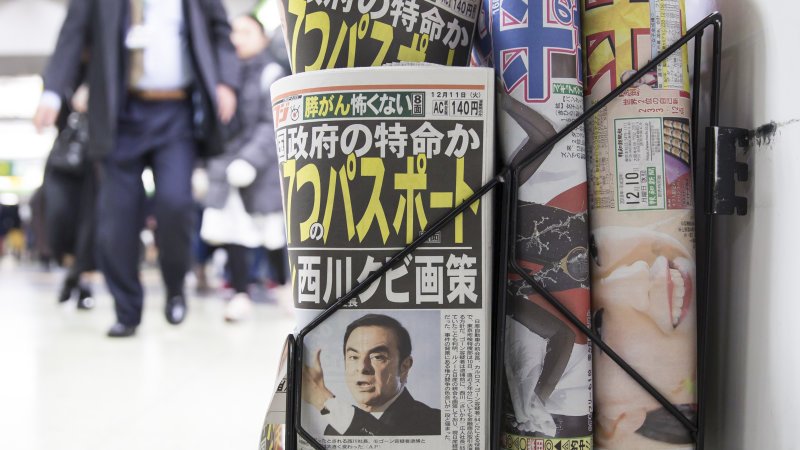Nissan's Carlos Ghosn offers to wear electronic ankle tag if released

Ousted Nissan Chairman Carlos Ghosn has offered to wear an electronic ankle tag and hire guards to monitor him in an unusual bid to secure his release on bail after two months of harsh detention in Japan for alleged financial crimes.
Ghosn is also willing to remain in Tokyo, where he has leased an apartment, and post stock he owns in Nissan as collateral, his spokeswoman said. A new bail hearing is set for Monday after an earlier request was denied due partly to concerns the French executive was a flight risk.
His release would allow Ghosn to meet more frequently with his lawyers and defend himself before the board of Renault, where he remains chairman and CEO, amid calls for his removal and potential moves to restructure the Nissan tie-up.
Ghosn denies any wrongdoing as he awaits trial on charges of financial misconduct.
"I will attend my trial not only because I am legally obligated to do so, but because I am eager to finally have the opportunity to defend myself," Ghosn said in a statement on Sunday.
"I am not guilty of the charges against me, and I look forward to defending my reputation in the courtroom."
Meanwhile, Ghosn's wife, Carole Ghosn, has written to French President Emmanuel Macron to discuss her husband's situation, her public relations representative said.
The representative, Devon Spurgeon, confirmed a report in French paper Journal du Dimanche that a letter had been sent to Macron this month, but declined to provide details.
France wants a full merger
As Ghosn's arrest on Nov. 19 continued to cloud the outlook for Nissan's three-way alliance with France's Renault and Mitsubishi Motors, Nissan said it was not the time to discuss revising the partners' capital ties.
Ghosn, who spearheaded Nissan's turnaround two decades ago, had pushed for a deeper tie-up between Nissan and Renault, including possibly a full merger by 2020, despite strong reservations at the Japanese firm.
"We are not at the stage for such discussions," Nissan CEO Hiroto Saikawa told reporters on Monday.
Saikawa said he had not heard directly about a reported proposal by the French government to integrate the Japanese carmaker's management with Renault.
The Nikkei newspaper reported on Sunday that a French government delegation had informed Tokyo that it would seek an integration of Renault and Nissan, most likely under the umbrella of a single holding company.
"Since I have not heard this directly, I cannot comment," Saikawa told reporters.
Japanese public broadcaster NHK quoted French Economy Minister Bruno Le Maire as telling journalists that an integration proposal was "not on the table now."
A source familiar with Nissan's thinking said the reported French proposal did not "make sense" given the two companies' different cultures, Renault's lower productivity and Nissan's bigger contribution of key technology.
"It's a virtual merger, I don't think it makes sense," the source said, adding he had not heard directly of such a French proposal.
'Questionable ethical standards'
Renault, which dominates the partnership through its 43.4 percent stake in Nissan, is expected to meet within days to consider potential candidates to replace Ghosn as chief executive officer and chairman. Michelin Chief Executive Jean-Dominique Senard could be a good choice, French finance minister Bruno Le Maire said in a newspaper interview.
The co-chair of a committee set up by Nissan to examine the root cause of Ghosn's alleged financial misconduct and propose corporate governance reforms said on Sunday he believed Ghosn may have had dubious standards.
"Having read the report on the internal investigation, my initial impression was that the head of the company may have had questionable ethical standards," committee co-chair Seiichiro Nishioka told a briefing late on Sunday after the panel held its first meeting.
Nishioka, a former judge, added that he also saw problems with Nissan's governance, including the process of determining compensation for directors.
The panel, comprising three Nissan external directors and four third-party members, expects to meet three or four times before making recommendations to Nissan's board in March on how to tighten lax governance and approval processes for matters including director compensation and chairman selection.
All seven members attended the first meeting in Tokyo, including Jean-Baptiste Duzan, an external director based in France.
For four hours, they discussed issues with two people involved with Nissan including how power had been heavily concentrated with Ghosn for years, Nishioka said, and possible ways to avoid such focus in the future.
Nishioka added that such a concentration of authority in one person was "questionable."
Nissan and partner Mitsubishi Motors, in which Nissan owns a controlling 34 percent stake, have been conducting their own internal investigations into alleged wrongdoing by Ghosn.
On Friday both accused him of improperly receiving $9 million in compensation from a joint venture between the two automakers, raising the possibility that the former boss of the Nissan-Renault alliance could face a fresh charge of embezzlement.
Nouvelles connexes


